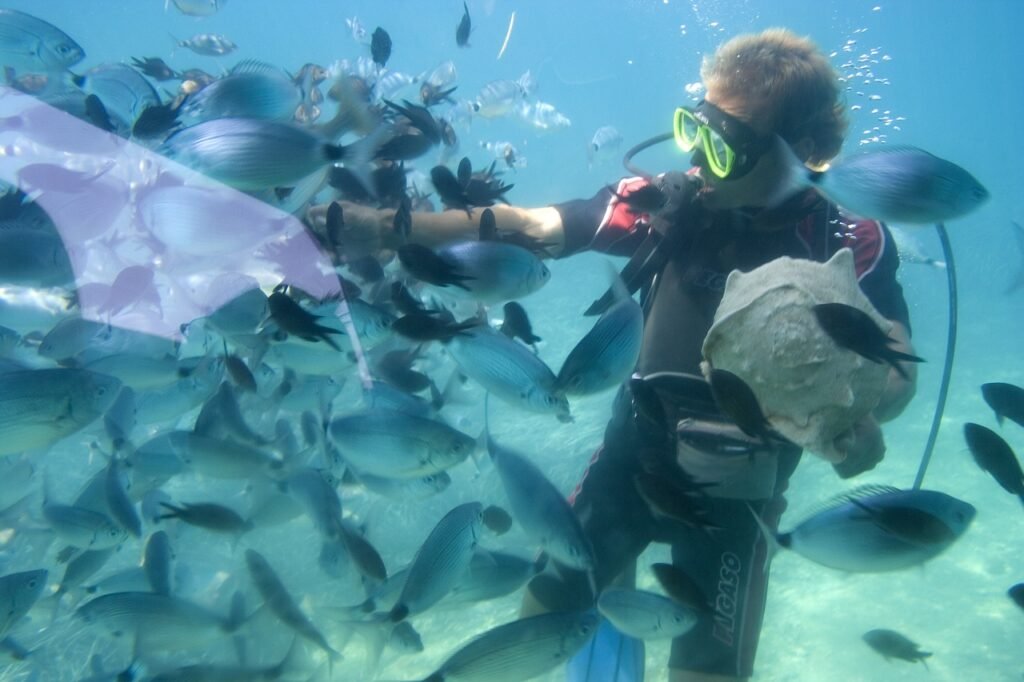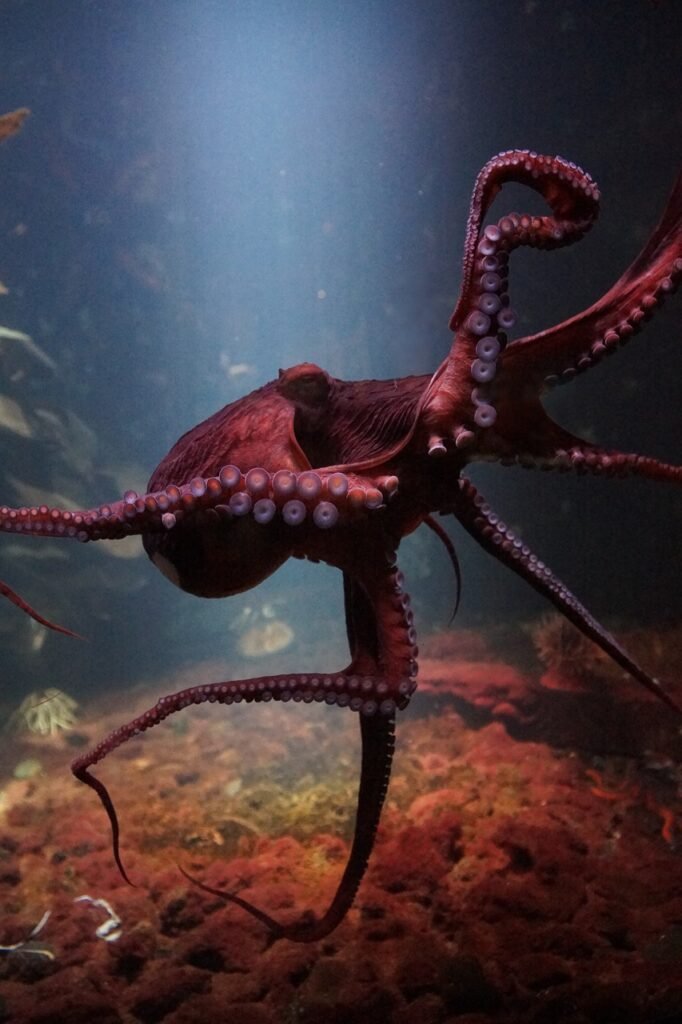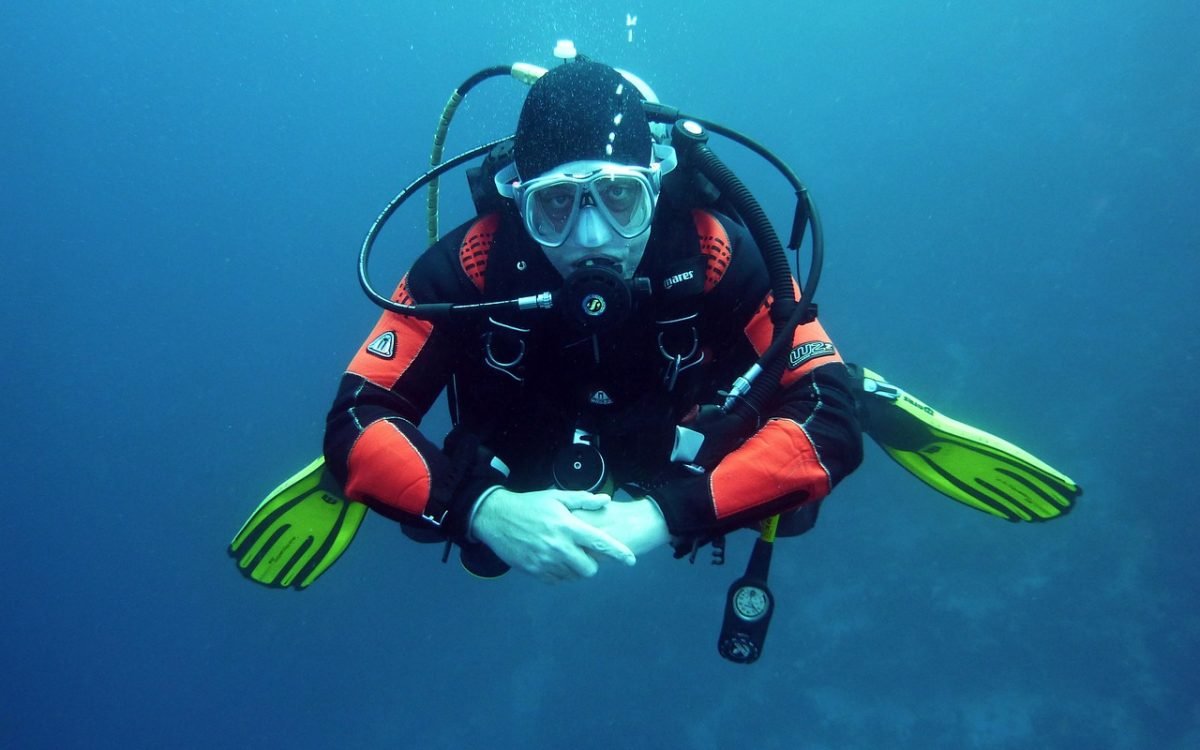The latest trends in diving on holidays are:
- The global scuba diving equipment market is expected to reach $4.9 billion by 2026, which means more people are taking up the sport and investing in their own gear. This could also indicate a higher demand for diving destinations and services.
- The most popular diving destinations in 2022 were Australia, Indonesia, Egypt, Maldives, and Mexico. These countries offer diverse and rich marine life, coral reefs, wrecks, caves, and other attractions for divers of all levels and preferences.
- The scuba diving industry is becoming more environmentally conscious and responsible, with initiatives such as Project AWARE, Green Fins, and Dive Against Debris. These initiatives aim to protect the ocean, raise awareness, and reduce the impact of diving activities on the marine environment.
- The scuba diving industry is also embracing new technologies and innovations, such as digital logbooks, underwater drones, smart dive computers, and virtual reality. These technologies enhance the diving experience, improve safety, and create new opportunities for learning and exploration.
A Wonderful Scent Of Winter Nights, Snow And New Year
- Snorkeling gear quality and innovation: Snorkeling gear has improved in terms of material, design, and features. Snorkelers can choose from different types of masks, snorkels, and fins that suit their preferences and needs. For example, some snorkels have dry valves that prevent water from entering, some masks have panoramic lenses that offer a wider view, and some fins have adjustable straps that provide a better fit.
- Snorkeling destinations and experiences: Snorkeling destinations are becoming more diverse and adventurous. Snorkelers can explore reefs, wrecks, caves, and other underwater habitats in various locations around the world. Some of the most popular snorkeling destinations in 2022 were Australia, Indonesia, Egypt, Maldives, and Mexico. Snorkelers can also enjoy different experiences such as night snorkeling, snorkeling with marine animals, or snorkeling with a guide.
- Snorkeling awareness and responsibility: Snorkeling awareness and responsibility are increasing among snorkelers and the industry. Snorkelers are becoming more conscious of the environmental impact of their activities and how to minimize it. They are also learning more about the marine life and the conservation efforts that protect them. Some initiatives that promote snorkeling awareness and responsibility are Project AWARE, Green Fins, and Dive Against Debris. These initiatives aim to protect the ocean, raise awareness, and reduce the impact of snorkeling activities on the marine environment.

Australia has the Great Barrier Reef which is probably one if the greatest places to dive.
Australia has many amazing snorkeling spots where you can enjoy the beauty and diversity of the underwater world. Some of the best snorkeling spots in Australia are:
- The Great Barrier Reef, Queensland: This is one of the most famous and largest coral reef systems in the world, home to thousands of species of fish, coral, and other marine life. You can snorkel from the shore or take a boat to various islands and reefs. Some of the best places to snorkel in the Great Barrier Reef are Heron Island, Green Island, Fitzroy Island, and the Whitsundays.
- Ningaloo Reef, Western Australia: This is another stunning coral reef that stretches for 260 km along the coast of Western Australia. You can snorkel with whale sharks, manta rays, turtles, and dolphins in the clear and warm waters. Some of the best places to snorkel in Ningaloo Reef are Coral Bay, Exmouth, and Turquoise Bay.
- Julian Rocks, New South Wales: This is a small group of rocky islands off the coast of Byron Bay that attracts a variety of marine life due to the mixing of warm and cold currents. You can snorkel with sharks, rays, turtles, and fish in the shallow and calm waters. The best time to snorkel in Julian Rocks is from May to November.
- Lord Howe Island, New South Wales: This is a UNESCO World Heritage Site that lies 600 km off the mainland of Australia. It has a pristine and diverse marine environment that supports over 500 species of fish and 90 species of coral. You can snorkel from the beach or take a boat to various lagoons and reefs. Some of the best places to snorkel in Lord Howe Island are Lagoon Beach, Ned’s Beach, Old Settlement Beach, and Erscott’s Hole.
- Baird Bay, South Australia: This is a secluded bay on the Eyre Peninsula that offers a unique opportunity to snorkel with wild dolphins and sea lions. You can interact with these friendly and curious animals in their natural habitat. The best time to snorkel in Baird Bay is from September to May.

Why is it that scuba divers and surfers are some of the strongest advocates of ocean conservation? Because they’ve spent time in and around the ocean, and they’ve personally seen the beauty, the fragility, and even the degradation of our planet’s blue heart.
Divers can help out in conservational management of reefs and diving places by participating in various activities that aim to protect and restore the marine environment. Some of these activities are:
- Joining reef monitoring and research projects: Divers can help collect and record data on the health and status of coral reefs, such as fish populations, water quality, coral bleaching, and disease. This data can help scientists and managers understand the threats and challenges facing the reefs and develop effective conservation strategies. For example, divers can join REEF, a non-profit group that conducts fish counts and sea life surveys.
- Participating in reef restoration and rehabilitation projects: Divers can help repair and restore damaged or degraded coral reefs by reattaching broken coral fragments, removing harmful debris, or transplanting healthy coral colonies. This can help enhance the reef’s resilience and recovery. For example, divers can join Reef Renewal Foundation Bonaire, a non-profit group that operates coral nurseries and outplants corals to local reefs.
- Supporting sustainable diving practices and eco-friendly businesses: Divers can help reduce their impact on the marine environment by following responsible diving practices, such as avoiding touching or damaging corals, controlling their buoyancy, and disposing of their waste properly. They can also support dive operators and businesses that prioritize sustainability and environmental protection. For example, divers can join Green Fins, a global initiative that promotes best practices for diving and snorkeling activities.
- Raising awareness and educating others about marine conservation issues: Divers can help spread the word and inspire others to care about the ocean and its inhabitants. They can share their experiences, stories, and photos with their friends, family, and social media followers. They can also attend or host talks, workshops, or events that educate people about the importance and challenges of marine conservation. For example, divers can join PADI AWARE Foundation, a non-profit group that supports ocean education and advocacy.






